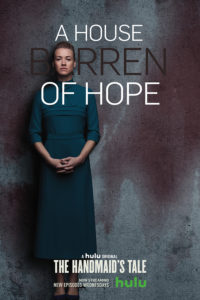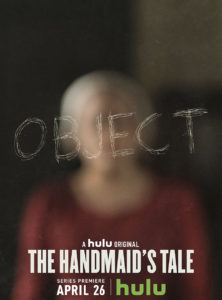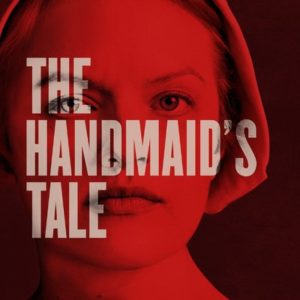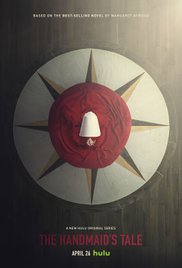 This post includes spoilers for “The Other Side” (Season 1, Episode 7) of The Handmaid’s Tale. It also includes spoilers for the book. As usual, the link on the left has full summaries of all of the episodes that have aired so far.
This post includes spoilers for “The Other Side” (Season 1, Episode 7) of The Handmaid’s Tale. It also includes spoilers for the book. As usual, the link on the left has full summaries of all of the episodes that have aired so far.
One of the things that always bothered me about the original version of The Handmaid’s Tale was that neither Offred nor the audience ever learns what happens to her husband, Luke, in it. She eventually did get some information about the fate of their daughter, but not having that same sense of closure for Luke was troubling.
After this episode, I’m so glad I’ve been avoiding spoilers for this show most of the time. I didn’t know that we were going to learn the fate of Luke, or that he’d get an entire episode dedicated to telling his side of the story after June and their daughter were kidnapped. I’ve been assuming all this time that Luke died during their escape attempt. To see him again was a wonderful surprise.
It turns out that Luke was shot in the stomach by the Guardians a few minutes after June and their child ran into the woods. Hoping to be able to interrogate him, the Guardians called for an ambulance to take him to the hospital. Interspersed between these scenes were flashbacks to when and how Luke and his family decided to try to flee to Canada.
While on the way to the hospital, the ambulance got into an accident that killed everyone in the vehicle except for Luke. Having him escape through pure luck made a lot of sense for his character because Luke’s previous life hadn’t given him any special training at all in stuff like hand-to-hand combat or the use of firearms. He had the average person’s understanding of how these things work, so I really appreciated the fact that the writers didn’t try to change this about him
After Luke escaped, he walked in the direction where his wife and daughter had fled. He found a few personal effects that they’d lost when they were captured, but he still had no idea where they’d gone or what had happened to them. Soon after that, he wandered into an abandoned town and was rescued by a small school bus full of a motley crew of kind strangers who were trying to flee the new regime and who described themselves as “an army brat, two strays, a gay and a nun.” My favourite scene in this week’s episode was when Luke realized he’s just cussed in front of a nun and apologized for it while they were treating his wounds.
What surprised me the most about “The Other Side” was how much I liked these new characters. So far, we’ve met a lot of folks who have been either openly supportive of Gilead or who are the biggest victims of it. Everyone else’s opinions of it were muted until now.
This episode showed how people who weren’t designated to become Handmaids or high-ranking officers in the new social order responded to the coup and all of the violent things that happened once the Sons of Gilead seized power. If you’re a sensitive viewer, don’t worry. Most of these scenes either happened very quickly or happened after people were killed.
I’m going to be honest with you here, readers. This whole time I’ve been assuming that a fairly high percentage of the people in what was once the United States were either neutral to or actively supportive of most of Gilead’s politics due to what life was like for Offred and the other Handmaids, so it came as a surprise to find out just how much resistance there was to the new government in rural areas.
One of the people from the bus was a former Handmaid who was so traumatized by her experiences in the Red Centre that she no longer spoke. No one even knew her name, and yet the entire group took care of her at the expense of their own safety.
There were other signs of resistance as well. When Luke, June, and Hannah stayed at a temporary safehouse in the middle of the woods on their way to Canada, one of their new neighbours discovered them there. I thought for sure he’d turn them in for a reward, but he kept their secret instead and later tipped them off right before the Guardians swooped down on their cabin.
In a later scene, Luke attempted to run away from the bus people and go find his family. One of his rescuers convinced him to keep moving towards Canada by showing him what happens to anyone who fights back against Gilead. The reason why so many of those small towns were eerily empty now is that they’d been doing things like hiding fertile women and fighting back when the Guardians attempted to separate families.
Gilead’s response to that was to hang every infertile adult from the rafters of the church. You can see a quick glimpse of that scene in the teaser for this episode:
Is it worth it to fight back against terror and injustice if doing so will only get you swiftly killed? I love the fact that this show asks that question but refuses to answer it. Every viewer must come up with their own response to it.
The rest of the journey to Canada was anything but safe. Only Luke and the mute woman made it safely across the border. Once again, I was surprised. I honestly thought that most – if not all – of the people he met were going to become at least semi-regular characters on this series. This is one of the few things I would have liked to see done differently about Luke’s story, although I understand why it was written that way. It matched the earlier scene in the church well. GIlead is not a forgiving place for anyone who steps out of line.
As someone who has lived in Toronto for many years, it was fascinating to see the last few scenes take place in my city. Of course U.S. refugees would pick Toronto as the place to set up Little America while they searched for missing loved ones! Many other countries and cultures have done similar things here. There are many neighbourhoods here where you can honestly feel as tough you’ve stepped into faraway places like Italy, China, India, or Korea.
I also liked seeing how this episode ended. The note that Offred wrote to Luke in episode 6 was safely delivered. They both know that each other are live. Now we have to wait and see what will happen to them next. Will there be a rescue mission? Will we find out where Hannah is? I’m hoping that both of the answers to those questions are yes.
Previous posts in this series:
5 Things I Want from The Handmaid’s Tale

 This post includes spoilers for “A Woman’s Place” (Season 1, Episode 6) of
This post includes spoilers for “A Woman’s Place” (Season 1, Episode 6) of  Offred
Offred Speculative fiction is an umbrella term for everything from science fiction to dystopians, fantasy to horror.
Speculative fiction is an umbrella term for everything from science fiction to dystopians, fantasy to horror. There is something to be said for immersing yourself in a completely different world when you need a short break or could use some encouragement.
There is something to be said for immersing yourself in a completely different world when you need a short break or could use some encouragement.
 I have not decided yet if I have sympathy for Serena Joy (who is pictured on the right). The way she treated Offred was abusive and abysmal in this episode, but I’ve also seen the men in her life treat her terribly, too.
I have not decided yet if I have sympathy for Serena Joy (who is pictured on the right). The way she treated Offred was abusive and abysmal in this episode, but I’ve also seen the men in her life treat her terribly, too. This post includes spoilers for “Offred” (Season 1, Episode 1) and “Birth Day” (Season 1, Episode 2 )of
This post includes spoilers for “Offred” (Season 1, Episode 1) and “Birth Day” (Season 1, Episode 2 )of  There are only two days left until The Handmaid’s Tale premiers on Hulu.
There are only two days left until The Handmaid’s Tale premiers on Hulu. Reason #1: I Already Know I’ll Like the Story.
Reason #1: I Already Know I’ll Like the Story.  Reason #3: I Know I’ll Find Something New in Them Every Time
Reason #3: I Know I’ll Find Something New in Them Every Time One of the first things my spouse introduced me to after we moved in together was the TV show Buffy the Vampire Slayer.
One of the first things my spouse introduced me to after we moved in together was the TV show Buffy the Vampire Slayer. isodes before deciding that it’s not my cup of tea and I won’t be watching it again. There were a few specific scenes that I enjoyed, but the storylines in general simply don’t appeal to me.
isodes before deciding that it’s not my cup of tea and I won’t be watching it again. There were a few specific scenes that I enjoyed, but the storylines in general simply don’t appeal to me.